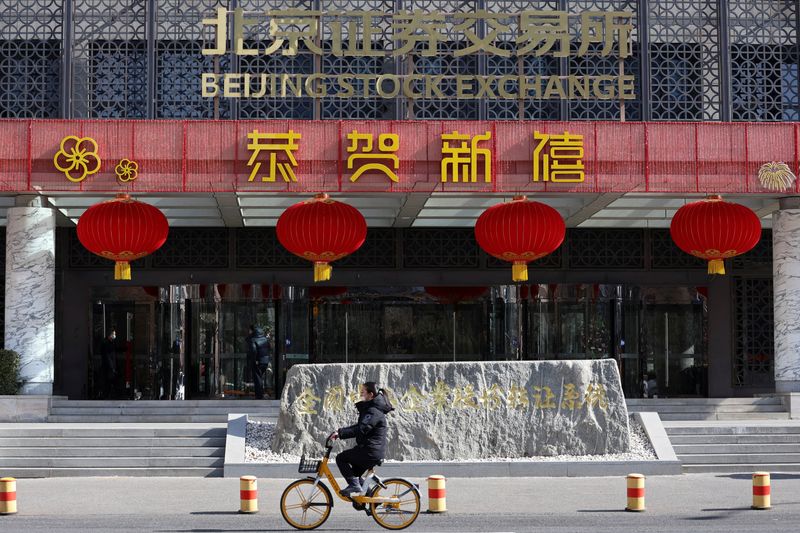By Koh Gui Qing and Ankur Banerjee
NEW YORK/SINGAPORE (Reuters) -Global shares rose on Friday buoyed by the prospect of lower U.S. interest rates following comments from President Donald Trump, while the yen steadied ahead of a widely expected rate hike from the Bank of Japan later in the day.
In a sign of policies to come, Trump told business leaders at the World Economic Forum in Davos, Switzerland, on Thursday that he wants to lower global oil prices, interest rates and taxes, and warned of tariffs on exports to the United States.
“I’ll demand that interest rates drop immediately. And likewise, they should be dropping all over the world,” Trump said from Washington via video conference on Thursday.
The comments moved markets, with the hitting a record high and the dollar on the defensive as investors remain cautious about Trump’s next moves on trade and tariffs.
“No politician advocates for higher rates and he (Trump) has always put himself out there as a low rates guy,” said Prashant Newnaha, a senior Asia-Pacific rates strategist at TD Securities. “Expect the president to become more vocal and critical of the Fed.”
MSCI’s broadest index of Asia-Pacific shares outside Japan rose 0.29%, in line with Wall Street, while China’s blue-chip index was little changed in early trading.
Investors continued to digest the plans announced by China on Thursday to channel hundreds of billions of yuan of investment from state-owned insurers into shares.
With no new details on Trump’s tariff plans, the uncertainty has weighed on bond prices. Treasury yields have been on the rise as bond investors brace for eventual tariffs that may stoke inflation.
The
“Trump had already signalled the desire for lower rates before his return, and U.S. data simply does not allow for the level of easing Trump wants without lighting a match under inflation,” said Matt Simpson, a senior market analyst at City Index.
AWAITING BOJ
The spotlight on the day will be on the BOJ, with the European Central Bank and the Federal Reserve due to meet next week as policymakers digest early moves of the Trump administration.
Markets have already fully priced in a 25-basis-point rate hike from the BOJ that would take rates in Japan to their highest since the 2008 global financial crisis.
Kristina Clifton, economist at the Commonwealth Bank of Australia (OTC:), said the lack of immediate announcements on tariffs from Trump in his early days as president has supported the markets view for a hike on Friday.
“In our view, if the BOJ hikes today there is a good chance that there is a dovish tone because there is still a high risk of economic and market disruptions from U.S. policy.”
The yen was steady at 156.21 per dollar, near the one-month high of 154.78 it touched earlier this week, while the yields on shorter ended Japanese government bonds rose ahead of the decision. The was up 0.38% in early trading.
Currency markets in general have been tentative after a volatile few sessions since Trump’s return to the White House, driven by his pronouncements on tariffs.
Trump has said he plans to impose duties on imports from Mexico and Canada from Feb. 1 and has said he will apply tariffs on imports from the European Union.
The , which measures the currency against six others, languished near a two-week low of 108.13 and was poised for a more than 1% drop for the week, its weakest performance in two months. [FRX/]

Oil prices remained well below $80 a barrel, under pressure after Trump said he will be asking Saudi Arabia and OPEC to bring down oil prices.
futures fell 0.56% to $77.85 a barrel. U.S. West Texas Intermediate crude (WTI) was down 0.51% at $74.24.[O/R]







